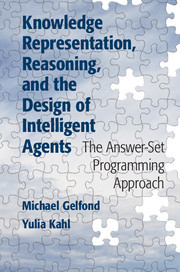Description
Knowledge Representation, Reasoning, and the Design of Intelligent Agents
The Answer-Set Programming Approach
Authors: Gelfond Michael, Kahl Yulia
This in-depth introduction for students and researchers shows how to use ASP for intelligent tasks, including answering queries, planning, and diagnostics.
Language: English
Subject for Knowledge Representation, Reasoning, and the Design of...:
Approximative price 61.25 €
In Print (Delivery period: 14 days).
Add to cart
Publication date: 03-2014
360 p. · 15.7x23.5 cm · Hardback
360 p. · 15.7x23.5 cm · Hardback
Description
/li>Contents
/li>Biography
/li>
Knowledge representation and reasoning is the foundation of artificial intelligence, declarative programming, and the design of knowledge-intensive software systems capable of performing intelligent tasks. Using logical and probabilistic formalisms based on answer set programming (ASP) and action languages, this book shows how knowledge-intensive systems can be given knowledge about the world and how it can be used to solve non-trivial computational problems. The authors maintain a balance between mathematical analysis and practical design of intelligent agents. All the concepts, such as answering queries, planning, diagnostics, and probabilistic reasoning, are illustrated by programs of ASP. The text can be used for AI-related undergraduate and graduate classes and by researchers who would like to learn more about ASP and knowledge representation.
1. Logic-based approach to agent design; 2. Answer set Prolog (ASP); 3. Roots of ASP; 4. Creating a knowledge base; 5. Representing defaults; 6. The answer set programming paradigm; 7. Algorithms for computing answer sets; 8. Modeling dynamic domains; 9. Planning agents; 10. Diagnostic agents; 11. Probabilistic reasoning; 12. The Prolog programming language.
Dr Michael Gelfond is a Professor of Computer Science at Texas Tech University. He received his PhD from the Steklov Institute of Mathematics of the Academy of Sciences, St Petersburg, Russia. He is an AAA Fellow and serves as an Area Editor for the International Journal of Theory and Practice of Logic Programming and as an Executive Editor of the Journal of Logic and Computation. In 2004 and 2012 he was the recipient of the award for most influential paper in twenty years by the International Association of Logic Programming.
Yulia Kahl is a member of the Texas Action Group and the Knowledge Representation Lab at Texas Tech. She received her Master's in Computer Science, focusing on the use of ASP for planning. She has also worked as a programmer at IBM.
Yulia Kahl is a member of the Texas Action Group and the Knowledge Representation Lab at Texas Tech. She received her Master's in Computer Science, focusing on the use of ASP for planning. She has also worked as a programmer at IBM.
© 2024 LAVOISIER S.A.S.




